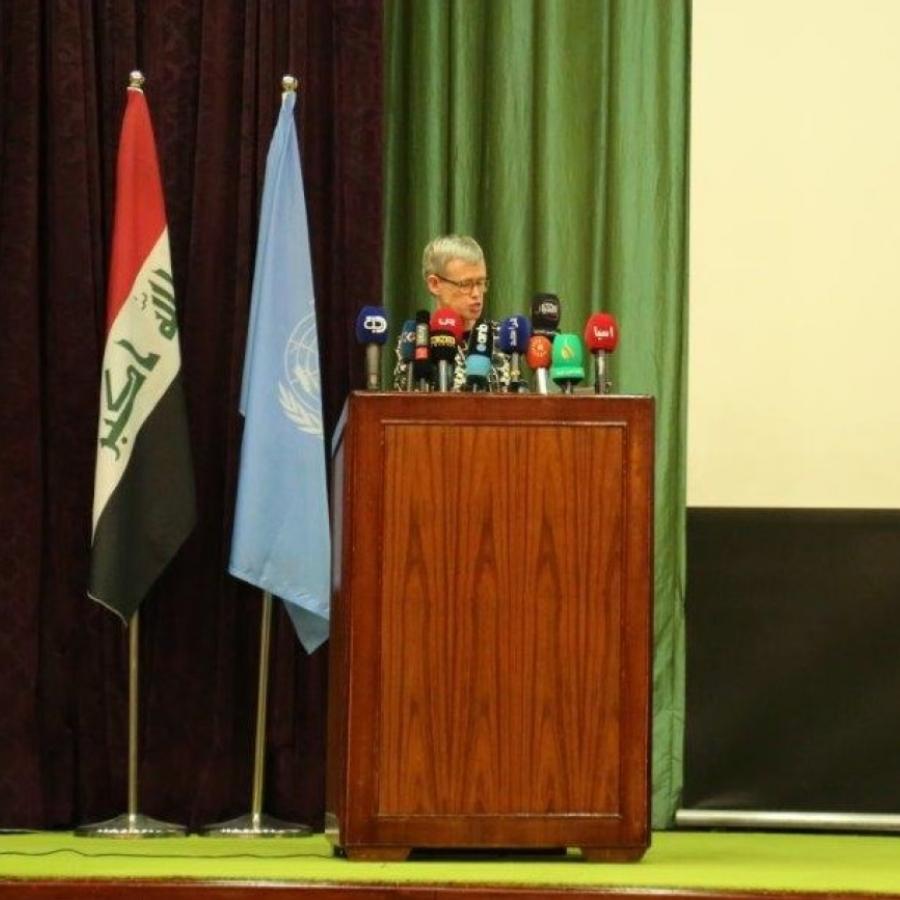International Day for the Elimination of Sexual Violence in Conflict | Alice Walpole
The United Nations in Iraq will continue to support the Government of Iraq in protecting the rights of gender-based violence survivors.

Distinguished Participants,
Dear Friends.
It is an honour to be here with you today to mark the International Day for the Elimination of Sexual Violence in Conflict, under this year’s theme “The Importance of a Survivor-Centred Approach”.
I’d like to start by quoting United Nations Security Council resolution 2467 on conflict-related sexual violence, adopted just two months ago. In its first operative paragraph, the Council “reiterates its demand for the complete cessation with immediate effect by all parties to armed conflict of all acts of sexual violence and its call for these parties to make and implement specific time-bound commitments to combat sexual violence.” It also, importantly, “encourages national authorities in this context to strengthen legislation to foster accountability for sexual violence.” This is a resolution, of course, which has particular resonance for Iraq.
For more than three years during the conflict with the so-called Islamic State of Iraq and the Levant (Daesh), women and girls were subjected to the most atrocious forms of violence, including sexual violence, as a weapon of war. They suffered horrific and prolonged sexual abuse. They were imprisoned, beaten, sold, burnt, raped and tortured. Despite an end to the conflict, many of these survivors continue to suffer from depression, crippling fear or panic attacks: some even consider self-harm or suicide.
It is widely agreed that a holistic approach is the best way to start rebuilding the resilience of survivors, minimising the risk of re-traumatisation, social exclusion and stigma. A survivor-centred approach ensures that the safety and welfare of survivors remain paramount. Which is why, when the United Nations Security Council adopted Resolution 2467, it articulated a survivor-centred approach to facilitate the prevention of, and response to, conflict-related sexual violence. The resolution recognises the need to ensure survivors of sexual violence have non-discriminatory access to services such as medical and psychosocial care. Equally important, as the resolution underlines, is the need to strengthen access to justice for survivors of conflict-related sexual violence, including through the prompt investigation, prosecution and punishment of the perpetrators of sexual and gender-based violence.
The United Nations Assistance Mission for Iraq is working to ensure that the aspirations of that resolution can be realised through concrete solutions on the ground in Iraq. For example, our senior women’s protection adviser has recently conducted training in Kirkuk for local NGOs working with survivors of conflict-related sexual violence, with a focus on identifying early-warning indicators. She has been working in coordination with UN agencies, funds and programmes to support the Government of Iraq in implementing the Joint Communiqué on Prevention and Response to Conflict-Related Sexual Violence. The implementation plan for the Communique includes as a priority the reintegration of, and services for, survivors of sexual violence and children born of these violations. United Nations bodies have been working together to expand our documentation of cases, historic and continuing, of conflict-related sexual violence, which we believe have been significantly under-reported.
More broadly, the United Nations in Iraq, through its specialised agencies, funds and programmes, has undertaken numerous initiatives in support of the efforts of the Government of Iraq to assist survivors of sexual violence. For example:
UNFPA established a Women and Girls Treatment and Support Centre in Dahuk in 2014 and another one in Fallujah in 2017, where the rights and needs of survivors are at the heart of response efforts and interventions. These two centres provide survivors of sexual violence in conflict with medical check-ups and treatment, psychological and psychiatric support sessions, and legal services.
UN Women is providing services and referrals, including psychosocial support and legal services, to female refugees and the displaced, including conflict-related sexual violence survivors, as well as to women and girls from host communities at risk or who are survivors of gender-based violence. UN Women has supported the rehabilitation of seven emergency shelters for gender-based violence survivors in Anbar, Kirkuk, Ninewa, Salahuddin, Dahuk, Baghdad and Erbil; and is also involved in capacity-building for Iraqi security forces on combatting gender-based violence.
UNHCR and its partners provide a range of services to conflict-related sexual violence survivors, including psychosocial support, legal assistance and referrals to appropriate assistance in several governorates across Iraq, with a focus on the survivor-centred approach. UNHCR and its partners also engage in a wide range of prevention activities, including a project on Engaging Men in Accountable Practices, implemented in a camp for the displaced in Erbil in 2018 and ongoing in two camps in Dahuk in 2019.
Meanwhile, the United Nations welcomes the current efforts of the Government of Iraq in drafting legislation in support of Yezidi survivors, which identifies and promotes the rights of female Yezidi survivors of sexual violence. The United Nations would like to see public recognition, too, for the survivors of sexual violence from other communities. Nor should we forget male survivors of conflict-related sexual violence, who endure a particular burden of shame and stigma.
The United Nations in Iraq will continue to support the Government of Iraq in protecting the rights of gender-based violence survivors, including survivors of sexual violence in conflict, as part of its commitment to advancing human rights and facilitating the achievement of sustainable peace and stability in Iraq.
I will close by taking this opportunity to reiterate the United Nations’ steadfast commitment to the empowerment of women and girls in Iraq.
Thank you.
صاحب الخطاب



